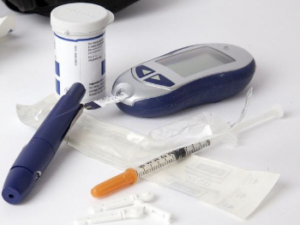- Social Factors Help Explain Worse Cardiovascular Health among Adults in Rural Vs. Urban Communities
- Reducing Barriers to Participation in Population-Based Total Cost of Care (PB-TCOC) Models and Supporting Primary and Specialty Care Transformation: Request for Input
- Secretary Kennedy Renews Public Health Emergency Declaration to Address National Opioid Crisis
- 2025 Marketplace Integrity and Affordability Proposed Rule
- Rural America Faces Growing Shortage of Eye Surgeons
- NRHA Continues Partnership to Advance Rural Oral Health
- Comments Requested on Mobile Crisis Team Services: An Implementation Toolkit Draft
- Q&A: What Are the Challenges and Opportunities of Small-Town Philanthropy?
- HRSA Administrator Carole Johnson, Joined by Co-Chair of the Congressional Black Maternal Health Caucus Congresswoman Lauren Underwood, Announces New Funding, Policy Action, and Report to Mark Landmark Year of HRSA's Enhancing Maternal Health Initiative
- Biden-Harris Administration Announces $60 Million Investment for Adding Early Morning, Night, and Weekend Hours at Community Health Centers
- Volunteer Opportunity for HUD's Office of Housing Counseling Tribe and TDHE Certification Exam
- Who Needs Dry January More: Rural or Urban Drinkers?
- Rural Families Have 'Critical' Need for More Hospice, Respite Care
- Rural Telehealth Sees More Policy Wins, but Only Short-Term
- States Help Child Care Centers Expand in Bid To Create More Slots, Lower Prices
988 Crisis Hotline Updates and Adds Social Media Infographics to Partner Toolkit
 The 988 Suicide & Crisis Lifeline has created new social media shareables designed for use as social media posts, stories, and threads. Please be sure to utilize these free tools in your health centers to continue to spread the word about the 988 Suicide and Crisis Lifeline. The free partner toolkit can be found here.
The 988 Suicide & Crisis Lifeline has created new social media shareables designed for use as social media posts, stories, and threads. Please be sure to utilize these free tools in your health centers to continue to spread the word about the 988 Suicide and Crisis Lifeline. The free partner toolkit can be found here.
See ONC’s Latest FAQs Addressing the Change Healthcare Cyberattack
The HHS Office of the National Coordinator (ONC) has updated FAQs on the Change Healthcare/UnitedHealth Group cyberattack, effective May 31, 2024. The FAQs address a variety of issues, including OCR’s investigation, breach report filing, ransomware guidance, HIPAA breach notifications by covered entities, and delegation of breach notifications. ONC indicates that under the HITECH Act, covered entities are ultimately responsible for ensuring that breach notifications occur. Of note, OCR says it understands that in this case, business associate notification to affected covered entities has not yet occurred and that UHG’s website states that they “are not announcing an official breach notification at this time. To help ease reporting obligations on other stakeholders whose data may have been compromised as part of this cyberattack, UHG has offered to make notifications and undertake related administrative requirements on behalf of any provider or customer.”1 OCR says it will not consider the 60-calendar day period from discovery of a breach by a covered entity to start until affected covered entities have received the information needed from Change Healthcare or UHG. ONC recommends that covered entities coordinate with Change Healthcare and UHG who will be providing the breach notifications. Review the HHS FAQs on the cyberattack. OCR plans to update the page as needed.
Sanofi Joins the Ranks of Manufacturers Tightening Restrictions on Use of Contract Pharmacies
 Unfortunately, there’s more bad news to share on the contract pharmacy (CP) front. Last week, the drug maker Sanofi – a major manufacturer of insulin – significantly tightened its restrictions on Community Health Center use of CPs, including placing unprecedented restrictions on CHC-owned off-site pharmacies. Sanofi was one of the first three drugmakers to impose CP restrictions, starting in October 2020. Since then, Sanofi has allowed CHCs to use unlimited CPs if they submitted data to ESP. To date, CHCs have also been able to designate a single CP for each care delivery site without an in-house pharmacy. The new rules, effective July 1, 2024:
Unfortunately, there’s more bad news to share on the contract pharmacy (CP) front. Last week, the drug maker Sanofi – a major manufacturer of insulin – significantly tightened its restrictions on Community Health Center use of CPs, including placing unprecedented restrictions on CHC-owned off-site pharmacies. Sanofi was one of the first three drugmakers to impose CP restrictions, starting in October 2020. Since then, Sanofi has allowed CHCs to use unlimited CPs if they submitted data to ESP. To date, CHCs have also been able to designate a single CP for each care delivery site without an in-house pharmacy. The new rules, effective July 1, 2024:
· Sanofi is ending the option for FQHCs to receive 340B pricing at an unlimited number of CPs in exchange for submitting data to ESP. (This leaves Gilead and Novo Nordisk as the only manufacturers who still allow health centers to avoid CP restrictions by reporting data to ESP.)
· FQHCs who own one (or more) of their own pharmacies are ineligible to receive 340B-priced Sanofi drugs at any contract pharmacy.
· FQHCs who do not own a pharmacy that is co-located within a care delivery site registered on OPAIS can designate a single contract pharmacy to receive 340B-priced drugs. These health centers will not be required to submit data to ESP for this CP and must designate their single CP on ESP as soon as possible – even if they have already designated a CP. It appears that all current CP designations will soon be erased.
· Sanofi distinguishes between two types of CHC-owned pharmacies: those that are co-located at an FQHC care delivery site registered on OPAIS (“CHC-owned on-site”), and those that are stand-alone (“CHC-owned off-site”). Sanofi effectively treats CHC-owned off-site pharmacies as CPs, making them ineligible to receive 340B-priced drugs unless the CHC has no on-site pharmacies and designates its CHC-owned off-site pharmacy as its single CP location. The new policy is very concerning as it marks the first time that any manufacturer (or other stakeholder) has sought to limit access to 340B drugs at CHC-owned pharmacies.
· ·Going forward, Sanofi will consider all of a CHC’s care delivery sites together as constituting a single covered entity (CE.) This means that the strategy of registering one pharmacy (in-house or contract) for each delivery site will no longer work for Sanofi.
Questions? Contact Eric Kiehl, PACHC Director of Policy and Partnership.
Pennsylvania Consumers Report Stolen SNAP Benefits
The Pennsylvania Department of Human Services (DHS) is reminding consumers to protect their Supplemental Nutrition Assistance Program (SNAP) benefits from skimming at point-of-sale machines or ATMs. Card skimmer devices have been reported in Philadelphia and Southeastern Pennsylvania. DHS announced in 2023 that Pennsylvanians who have had their SNAP benefits stolen can have their cards replaced but must fill out a Benefit Theft Claim within 60 calendar days of the incident.
Supreme Court to Hear Case Addressing Hospitals that Disproportionately Serve Low-Income Patients
 Reuters reported that the U.S. Supreme Court will hear a lawsuit alleging that Medicare underpays hospitals that serve low-income populations by an estimated $1.5 billion per year. The 200 hospitals across 32 states are requesting the court to overturn a U.S. Court of Appeals decision that upheld how the U.S. Department of Health and Human Services (HHS) calculates the Medicare disproportionate share hospital (DSH) funding. Hospitals argue that HHS only uses the number of Medicare patients who actually receive supplemental security income in their calculations and does not include those who are eligible but do not receive the benefit, when determining DSH funding. Read More.
Reuters reported that the U.S. Supreme Court will hear a lawsuit alleging that Medicare underpays hospitals that serve low-income populations by an estimated $1.5 billion per year. The 200 hospitals across 32 states are requesting the court to overturn a U.S. Court of Appeals decision that upheld how the U.S. Department of Health and Human Services (HHS) calculates the Medicare disproportionate share hospital (DSH) funding. Hospitals argue that HHS only uses the number of Medicare patients who actually receive supplemental security income in their calculations and does not include those who are eligible but do not receive the benefit, when determining DSH funding. Read More.
Pennsylvania Medicaid Program Launches Online Training Program

The Pennsylvania Office of Mental Health & Substance Abuse Services (OMHSAS) has launched a web-based training platform – MyOMHSAS – designed as a one-stop for online training and resources for OMHSAS staff as well internal and external stakeholders. MyOMHSAS is a collaboration with the Office of Developmental Programs (MyODP), the University of Massachusetts Medical School (UMass), and OMHSAS. The initial launch of MyOMHSAS at the end of April 2024 included a limited number of inaugural course modules including Assisted Outpatient Treatment (AOT), the Children’s Hospital of Philadelphia (CHOP) transgender webinar series, Child and Adolescent Service System Program (CASSP)/System of Care (SoC), and Suicide Screening modules. Additional offerings are under development, they include a crisis worker certification curriculum, under development in partnership with Temple University Harrisburg (TUH), which will be launched later this year as a pathway for entry-level crisis workers to achieve accreditation. A dedicated MyOMHSAS resource account is available for questions, feedback, suggestions, and other communication related to the platform: RA-PWMYOMHSAS@pa.gov.
Pennsylvania Health Department Offers Implicit Bias Training for Health Care Professionals
The Pennsylvania Department of Health Office of Health Equity is hosting virtual implicit bias trainings for all healthcare professionals in Pennsylvania. There are multiple dates and times available to reach all groups. The focus of this free workshop is to familiarize health care professionals to a framework for understanding how the experience of implicit biases and microaggressions impact health care experiences and outcomes for patients. Key strategies for recognizing and responding to implicit bias and microaggressions will be shared. Registration is available.
National Collaboration Formed to Address Cybersecurity at Rural Hospitals
The White House announced their collaborative efforts with Microsoft and Google that will provide a range of free or discounted cybersecurity services to rural hospitals across the country to help them in their efforts to prevent cyberattacks.
Microsoft has committed to working in close collaboration with The White House, the National Rural Health Association (NRHA), and the American Hospital Association (AHA) to coordinate the rollout, adoption and effectiveness of the program.
“Rural hospitals face a unique challenge in cybersecurity, balancing limited resources with the increasing sophistication of cyberthreats, which puts patient data and critical healthcare infrastructure at risk,” said Alan Morgan, chief executive officer of NRHA. “This important partnership with Microsoft will help ensure that rural hospitals are prepared in the future to meet this rising threat in small rural facilities.”
As part of this initiative to improve security and resilience of our rural hospital system, these private sector partners have committed to the following:
- For independent Critical Access Hospitals and Rural Emergency Hospitals, Microsoft is extending its nonprofit program to provide grants and up to a 75% discount on security products optimized for smaller organizations.
- For participating larger rural hospitals already using eligible Microsoft solutions, Microsoft is providing its most advanced security suite at no additional cost for one year. Additionally, Microsoft will extend security updates for Window 10 to participating hospitals for one year at no cost.
- Microsoft will also provide free cybersecurity assessments by qualified technology security providers and free training for frontline and IT staff at eligible rural hospitals throughout the country to deepen our resiliency to malicious cyberattacks.
- Google will provide endpoint security advice to rural hospitals and non-profit organizations at no cost, and eligible customers can get discounted pricing for communication and collaboration tools and security support and a pool of funding to support software migration.
- In addition, Google is committing to launch a pilot program with rural hospitals to develop a packaging of security capabilities that fit these hospitals’ unique needs.
Federal Administration Invests $11 Million to Expand Medical Residencies in Rural Communities

The U.S. Department of Health and Human Services (HHS), through the Health Resources and Services Administration (HRSA), awarded more than $11 million to 15 organizations to establish new residency programs in rural communities. HHS Secretary Xavier Becerra and White House Domestic Policy Advisor Neera Tanden announced the new awards while visiting rural health clinic in Wisconsin Rapids, Wisconsin today. Building on HRSA’s Enhancing Maternal Health Initiative, one program will create the first obstetrics and gynecology Rural Track Program in the country, and six others will develop new family medicine residency programs with enhanced obstetrical training in rural communities.
“Every American should have access to high-quality health care no matter where they live. That is why HHS is investing in programs that improve and expand access in geographic areas that have historically been underserved,” said HHS Secretary Xavier Becerra. “Training more doctors in our country’s rural areas is a proven strategy to recruit and retain doctors to serve rural communities. By funding new residency programs focused on OB-GYN training, we can help eliminate maternal care deserts, an important step in making pregnancy and childbirth safer.
“Rural communities need physicians, and the Health Resources and Services Administration is committed to helping build this workforce through steps like our work to create rural residency programs,” said HRSA Administrator Carole Johnson. “This funding will help build pathways for rural students to become doctors and help rural communities recruit and train more doctors. We are particularly pleased to support new programs aimed at training new physicians to care for pregnant women.”
Retaining and recruiting physicians in underserved and rural areas is a critical priority of the Biden-Harris Administration. These awards build on nearly $54 million that HRSA has invested in the Rural Residency Planning and Development Program (RRPD) since 2019. Past recipients of RRPD awards have created 46 accredited rural residency programs and have been approved to train 575 resident physicians overall. In this year’s 2024 Residency Match, RRPD-created residency programs matched 158 new residents who will start training this summer.
Award recipients will each receive up to $750,000 over three years to establish new rural residency programs. They will use this funding to support accreditation costs, curriculum development, faculty recruitment and retention, resident recruitment activities, and consultation services for program development. Many of today’s awardees will implement a Rural Track Program, which makes it possible for residency programs to provide their residents with experience in rural settings and increase access to health care in rural areas.
Access the list of awardees here.
Is “Social Infrastructure” the Solution to Loneliness and Social Isolation in Rural America?
A feature article in the latest edition of The Rural Monitor examines the ways that some rural leaders are finding to help their neighbors connect.
